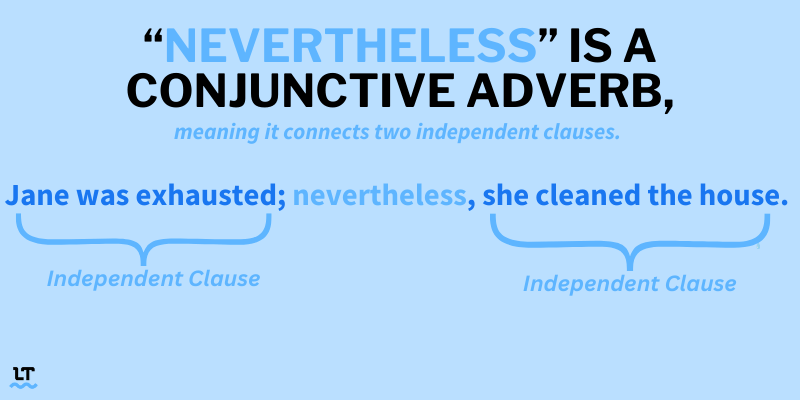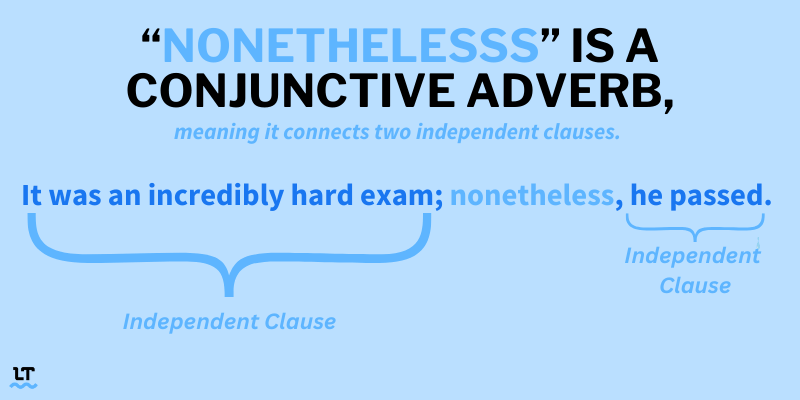“Nonetheless” vs. “Nevertheless”: Quick Summary
Nonetheless and nevertheless are considered synonyms and can therefore be used interchangeably. However, some grammarians argue that nevertheless should be used in time-related contexts, while nonetheless should be reserved for measurable contexts.
Table of Contents
“Nevertheless” vs. “Nonetheless”
“Nevertheless” Meaning and Examples
“Nevertheless” vs. “Nonetheless”
An online search for nonetheless and nevertheless in most major dictionaries will show you that these words are synonyms that mean “in spite of that.” Indeed, these words can usually be used interchangeably.
However, if you’re writing for an audience full of grammar purists, or if you are one, then you may want to familiarize yourself with the nuances of these two words.
Below, we’ll go over the definitions, provide example sentences, and explain the subtle differences between nevertheless and nonetheless.
“Nevertheless” Meaning and Examples
Nevertheless is defined as “despite what has just been stated.” In other words, nevertheless indicates that a clause is true regardless of another clause that has been or will be expressed.
Jane was exhausted; nevertheless, she cleaned the house.
In the sentence above, nevertheless shows that even though Jane was exhausted, she cleaned the house anyway.
Nevertheless is a conjunctive adverb, meaning it’s used to connect two independent clauses.

Nevertheless can be found at the beginning, middle, or end of a sentence.
If it appears at the beginning of a sentence or clause, it requires a comma after it. In the middle of a sentence, it’s usually preceded by a semicolon. At the end of a sentence, it’s often placed after a comma (but it doesn’t have to be).
When To Use “Nevertheless”
Now that we’ve reviewed what nevertheless means, let’s go over when to use it. If you break down the word, it’s easy to remember how to utilize it correctly: never-the-less.
Never is an adverb of time and frequency that means “not ever” or “at no time.”
Based on that fact, grammarians suggest using nevertheless to describe or modify facts for time-bound situations.
Our presentation was shorter compared to the other groups. Nevertheless, we were able to pique the crowd’s curiosity with our findings.
We missed the bus; nevertheless, we made it on time because Jerry saw us and gave us a ride.
We stayed longer than expected. Still, we had a great time nevertheless.
We should note that the word but can be found before nevertheless and is considered acceptable.
We were running late to the airport, but nevertheless, we patiently waited for everyone to say goodbye.
“Nonetheless” Meaning and Examples
Again, most major dictionaries will define nonetheless as “in spite of that,” but you can also think of it as meaning “in contrast to.” When you use nonetheless in a sentence, it shows that even though a previous point was made, something unexpected or contrary happened.
It was an incredibly hard exam; nonetheless, he passed.
Nonetheless is also a conjunctive adverb and therefore connects two independent clauses.

Nonetheless follows the same punctuation rules: If at the beginning of a sentence or clause, it must be followed by a comma. In the middle of a sentence, it’s usually preceded by a semicolon or a but. At the end of a sentence, it can be placed after a comma, but it isn’t required.
When to Use “Nonetheless”
Once more, breaking down nonetheless can aid in reminding you in what types of situations to use this word: none-the-less.
None can function as an adverb that means “not at all,” but it can also be used as a pronoun that means “not any” or “not one.” Because of this, those who strictly adhere to grammar principles would argue that nonetheless should be used specifically when referring to things that can be measurable or quantifiable.
I accidentally added too much sugar. Nonetheless, the cookies were a big hit at the bake sale.
We are facing several challenges; nonetheless, our employees are resilient and innovative, and they are figuring out new ways to work around these developments.
The kids were sad that the tickets were sold out. But we went to the arcade and had a fun day nonetheless.
The word but can also be used before nonetheless. We were starving, but nonetheless, we waited for everyone to arrive.
Nevertheless, Either Word Works
It’s worth reiterating that these words are largely interchangeable. We would recommend not focusing too much on these trivial differences, as both words would make sense whether you’re referring to a time-bound or measurable context.

After all is said and done, there are three options you could choose from:
- Use either nevertheless or nonetheless as most major dictionaries consider them to have the same meaning.
- Always use nevertheless as it is the more popular of the two.
- Opt out of using nevertheless or nonetheless, and use a synonym instead, such as: however, in spite of that, despite, even so, or yet.
If you decide on option number three, LanguageTool makes it incredibly easy to find synonyms—all you have to do is double-click on a word. Besides that, this intelligent, multilingual writing assistant can also paraphrase your sentences and ensure your text is free of grammar, spelling, and punctuation errors.
Go ahead, give it a try! It’s an incredibly powerful tool, but free nonetheless.

